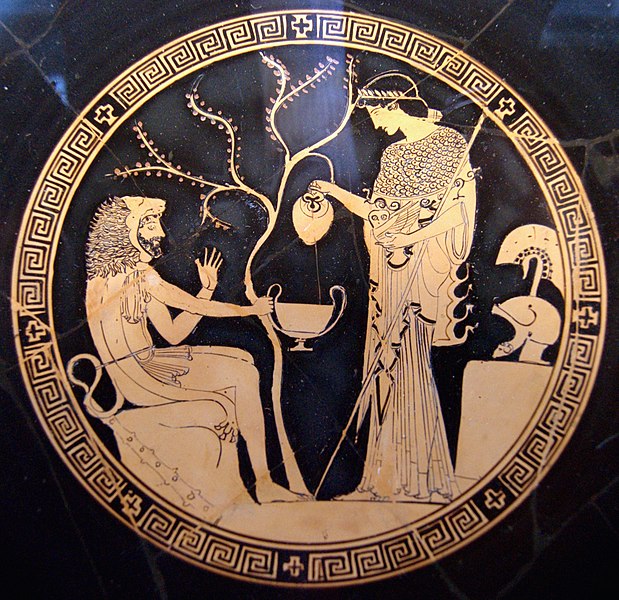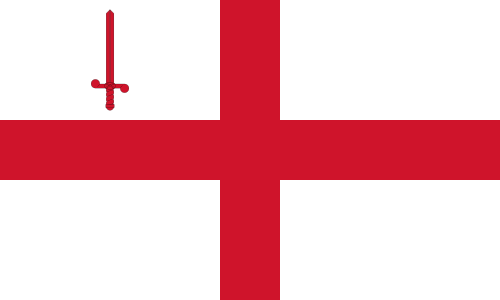One Greek legend said that the great Herakles (Hercules, in the Roman form) won a race at Olympia, a plain in the small state of Elis, and then decreed that the race should be re-enacted every four years. Another said that Zeus himself had originated the festival after defeating Cronus for the sovereignty of heaven.
2. What is the Olympic symbol? What is the Olympics motto? What is the Olympic flag and what do the symbols on it mean? Give your explanations with illustrations.
The symbol of the Olympic Games is composed of five interlocking rings, colored blue, yellow, black, green, and red on a white field. These five rings represent the five parts of the world which now are won over to Olympism and willing to accept healthy competition. The Olympic motto is the hendiatris Citius, Altius, Fortius, which is Latin for "Swifter, Higher, Stronger". The motto was introduced in 1924 at the Olympic Games in Paris.
3. When did women first take part in the modern Olympic Games? Give the details of the fields of sports women participated in.
Olympic events for women made their first appearance in 1908. In London women participated in competitions in archery, tennis and figure skating.
4. Why aren’t the Winter Olympic Games held in leap years now?Give the short overview of the history of winter Olympic Games.
Winter and Summer Events used to occur in the same year, always a leap year, divisible by the number 4. However, they frequently occurred at different locations. 1992 was the last year in which the Summer and Winter Olympics were held in the same year. The IOC decided to split the years so that one Olympics would occur every two years.
In 1994, the Winter Olympics were held again. Summer Olympics had to wait for the usual four years, until 1996, for their next celebration. Thus now Summer Olympics still only fall on leap years, and Winter Olympics fall either two years before or after a Summer Olympics. Both Olympics are still four years apart, after the initial two-year distance from 1992 to 1994.
5. What are the principles of the modern Olympic movement?
The goal of the Olympic Movement is to contribute to building a peaceful and better world by educating youth through sport practised without discrimination or any kind, in a spirit of friendship, solidarity and fair play.
6. When have the modern Olympic Games been cancelled and why?
The Olympic Games reached their zenith in the 6th and 5th centuries BC, but then gradually declined in importance as the Romans gained power and influence in Greece. There is no consensus on when the Games officially ended, the most common-held date is 393 AD, when the emperor Theodosius I declared that all pagan cults and practices be eliminated.
7. How many types of Olympic Games are there nowadays? When and where were the first Special Olympic Games officially held?
Nowadays there are 5 types of Olympic Games : Summer Olympic Games, Winter Olympic Games, Paralympic Games, Youth Olympic Games, Special Olympics World Games. The first International Special Olympics Summer Games were held in Chicago, Illinois, USA, in 1968.
8. Where will the next winter Olympic Games take place? Characterize the city.
The next XXI Olympic Winter Games will be held on February 12-28 2010, Vancouver, Canada. Vancouver is a coastal city located in the Lower Mainland of British Columbia, Canada. It is named for British Captain George Vancouver, who explored the area in the 1790s. The summer months are typically dry, often resulting in moderate drought conditions, usually in July and August. In contrast, the rest of the year is rainy, especially between October and March.
9. Why are the Olympic Games of 1936 and 1972 specific? Give a short overview of the events of those games.
The 1936 Summer Olympics was held in 1936 in Berlin, Germany. The games were the first to have live television coverage.
The 1972 Summer Olympics were held in Munich, in what was then West Germany, in 1972. On September 5, with six days left in the Games, eight Arab commandos slipped into the Olympic Village, killed two Israeli t
eam members and seized nine others as hostages. But IOC decided to continue Games.
10. What is the historical background of the marathon of the ancient and modern Olympic Games? Who hold the world records of the modern Olympic Games among men and women?
The name Marathon comes from the legend of Pheidippides, a Greek messenger. The legend states that he was sent from the battlefield of Marathon to Athens to announce that the Persians had been defeated in the Battle of Marathon, which took place in August or September, 490 BC. It is said that he ran the entire distance without stopping and burst into the assembly, exclaiming "Νενικήκαμεν" ('We have won.') before collapsing and dying.
- Today a lot of world records belong to:
- Michael Phelps - American swimmer.
- Usain Bolt - Jamacian sprinter
- Chris Hoy - British cyclist
- Yana Klochkova - Ukranian swimmer
- Claudia Pechstein - German speed skater
- Elena Isinbaeva - Russian pole vaulter
Links:
- http://www.solarnavigator.net/olympic_games.htm
- http://en.wikipedia.org/wiki/Olympic_Games_symbols
- http://en.wikipedia.org/wiki/Marathon
- http://en.wikipedia.org/wiki/1972_Summer_Olympics
- http://en.wikipedia.org/wiki/Special_Olympics_World_Games
- http://answers.yahoo.com/question/index?qid=20071230150532AA0qeOV
- http://www.olympic.org/en/content/The-IOC/The-IOC-Institution1/?Tab=1&NewsTab=0
- http://en.wikipedia.org/wiki/Vancouver
- http://www.solarnavigator.net/olympic_games.htm
- http://en.wikipedia.org/wiki/Olympic_Games















0 коммент.:
Post a Comment